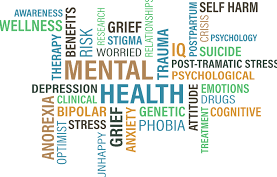Stress and Success: How High-Achieving Schools Score on Issues of Student Wellness

The number of students dealing with mental health issues is growing.
It is hardly news to students at Madison High School that their school district is one of the best in New Jersey, and is competitive with schools across the nation. Neighboring towns, such as Chatham, find similar success in the academic achievements of their students. However, this success often comes with a steep price at the cost of student’s well being. Some of the most prominent and familiar student wellness concerns include substance abuse (commonly in the form of vaping, drinking, and smoking), mental instability (commonly exhibited through rising anxiety and depression among students) and the resulting occurrences of suicidal thoughts. These can all be easily linked to the reports of increasing school stress, which leaves many students floundering to cope with the pressures of adolescence multiplied by the addition of social media and higher academic competition.
A recent report from the Chatham school district demonstrated these costs, revealing that 102 Chatham high school students had seriously considered suicide in the past year, and 50 middle school students had done the same. Though these numbers may seem low percentage- wise (the high school school has a population of over 1,000 students) but it is still much higher than the percentage of students who actually seek help with their suicidal thoughts. In Chatham, student assistance counselor Lisa Lattarulo attributes these suicidal thoughts with the ever-increasing stress levels present among students, which begins at a younger age throughout middle school, as kids begin to anticipate the academic competition of high school and college.
Social media and technology is also a large contributing factor to student wellness problems. It is often both part of the cause of mental problems, and part of the result of mental problems. Social media can become part of a cyclical spiral which begins with the introduction of a 24/7, highly competitive and deceptively superficial online world. Here, teens often find the pressure to acquire an impressive amount of “likes” on Instagram posts to be a looming anxiety, one which creates insecurity through the constant comparisons and competition of social media. Then, many students facing anxiety or depression from these normalized, unhealthy habits may attempt to find diversion in social media by binge-watching shows or mindlessly scrolling through images and videos. At the Chatham high school, student assistance counselor Lattarulo additionally connects social media to drug accessibility and substance abuse problems. She attributed the convenience and accessibility of social media as a key method by which students buy and distribute illegal substances, and as a major point of exposure to the world of substance abuse for younger kids who are joining these often under-regulated social media sites. Social media is clearly a new aspect of technology which is here to stay, however, it brings with it new challenges both for parents hoping to raise healthy teenagers and for teenagers struggling with the competitive, 24/7 pace of their digital lives.
With so much pressure on students to perform at high standards, it should no longer come as a surprise that many experience heightened mental health crisis and struggle to cope with these issues. However, Madison high school student assistance counselor Vanessa Morgenthaler stresses that students “need the opportunity to have open discussions about these issues, because the more communication that can be facilitated about problems like mental health, and substance abuse, the better.” She also suggests that students and parents seeking to further educate themselves about these problems look for reputable sources of information. “What’s really challenging is that when you google vape pens or marijuana, the first results that come up are sites supporting these drugs, or sites selling them. And for a student who is actually trying to be diligent and do the research on it, they can access biased and unreputable websites.” To avoid this biased information, Morgenthaler recommends sources such as the Madison Alliance Against Substance Abuse. Her webpage in the Madison High School teachers directory also contains reputable information about substance abuse, mental health, and coping skills. Though the pattern of stress and success can be seen at countless schools and among countless youth, the cycles of mental health issues and poor coping skills can be addressed. Stress is not necessarily a precursor to success; when student wellness begins to better reflect this, schools will be truly high-achieving.
https://www.tapinto.net/towns/chatham/articles/chatham-schools-report-152-seriously-considered
https://drugabuse.com/featured/drug-and-alcohol-abuse-across-generations/
